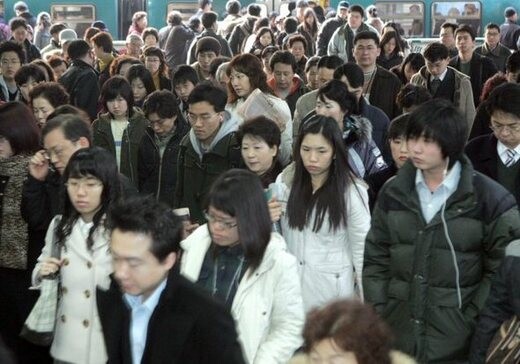hankyoreh
Links to other country sites 다른 나라 사이트 링크
More Koreans feel they have fallen into economic margins

The number of people who describe themselves as being within the ‘low-income’ class has risen over the past three years, according to a series of surveys conducted over time. In addition, more middle-income persons hold a negative view on capitalism than before.
According to a survey released on May 24 by Samsung Economic Research Institute and Sungkyunkwan University, 74 percent of 1,605 adults surveyed said they are in the middle-income class. The annual survey, named ‘The 2006 Korea General Society Survey,’ also showed that 24 percent said they are in the low-income class, while two percent answered they fall within the high-income class. Compared with the results of the same survey in 2003, the number of people who think they are in the middle-income class fell by five percentage points, while the number of people who think they are in the low-income class rose by the same number of percentage points.
Lee Dong-hun, a senior researcher at the Samsung Economic Research Institute, said, "The rate of [those who said they are in the] low-income class rose, as more people perceive the economic situation - such as unemployment and income levels - as deteriorating because of increased economic polarization."
The survey found that more middle-class Koreans hold a negative view of capitalism. When asked about their major perception of capitalism, of the 775 who responded they are in the nation’s median income range - a monthly average family income of between 2 and 4.99 million won (US$2,140-$5,350) - 32 percent picked "a gap between the rich and poor" while 21 percent answered "material prosperity." In the 2003 survey, 31 percent of the same income bracket picked "material prosperity" as their prime image of capitalism and 26 percent answered "a gap between the rich and poor." The rate of people in the middle-class survey group who chose "competition" as their image of capitalism rose to 20 percent from 17 percent in the 2003 survey. But not all was pessimistic: the rate of people in the middle-class group who anticipated a bright future for our economy rose to 48 percent from 43 percent.
In a separate survey of citizens’ faith in 16 major social institutions, the National Assembly was ranked the lowest in perceived credibility, followed by the central government, local governments, and the presidential office. These rankings were the same as in a 2003 survey. On a 100-point scale, financial institutions, the medical establishment and the academic circle were at the top of the credibility heap, jointly ranked first with 84 points each. Large firms saw their ranking rise to seventh from 11th in the prior survey, and the ranking of financial institutions jumped to first from sixth.
"The credibility of financial institutions and big companies was likely to improve as more people are turning to concerns about the economic situation," Lee said.
When asked "the most important thing in life," health and family came first and second, respectively. The ranking of "occupation" fell to sixth from third, while that of "religion" rose to fifth from 10th.
Please direct questions or comments to [englishhani@hani.co.kr]
Editorial・opinion
![[Column] Season 2 of special prosecutor probe may be coming to Korea soon [Column] Season 2 of special prosecutor probe may be coming to Korea soon](https://flexible.img.hani.co.kr/flexible/normal/500/300/imgdb/original/2024/0426/3317141030699447.jpg) [Column] Season 2 of special prosecutor probe may be coming to Korea soon
[Column] Season 2 of special prosecutor probe may be coming to Korea soon![[Column] Park Geun-hye déjà vu in Yoon Suk-yeol [Column] Park Geun-hye déjà vu in Yoon Suk-yeol](https://flexible.img.hani.co.kr/flexible/normal/500/300/imgdb/original/2024/0424/651713945113788.jpg) [Column] Park Geun-hye déjà vu in Yoon Suk-yeol
[Column] Park Geun-hye déjà vu in Yoon Suk-yeol- [Editorial] New weight of N. Korea’s nuclear threats makes dialogue all the more urgent
- [Guest essay] The real reason Korea’s new right wants to dub Rhee a founding father
- [Column] ‘Choson’: Is it time we start referring to N. Korea in its own terms?
- [Editorial] Japan’s rewriting of history with Korea has gone too far
- [Column] The president’s questionable capacity for dialogue
- [Column] Are chaebol firms just pizza pies for families to divvy up as they please?
- [Column] Has Korea, too, crossed the Rubicon on China?
- [Correspondent’s column] In Japan’s alliance with US, echoes of its past alliances with UK
Most viewed articles
- 1[Column] Season 2 of special prosecutor probe may be coming to Korea soon
- 2‘We must say no’: Seoul defense chief on Korean, USFK involvement in hypothetical Taiwan crisis
- 3No good, very bad game for Korea puts it out of Olympics for first time since 1988
- 4Is Japan about to snatch control of Line messenger from Korea’s Naver?
- 5Division commander ordered troops to enter raging flood waters before Marine died, survivor says
- 6Is N. Korea threatening to test nukes in response to possible new US-led sanctions body?
- 7Korea’s 1.3% growth in Q1 signals ‘textbook’ return to growth, says government
- 8N. Korean delegation’s trip to Iran shows how Pyongyang is leveraging ties with Moscow
- 9[Editorial] Korea’s surprise Q1 growth requires objective assessment, not blind fanfare
- 10Amnesty notes ‘erosion’ of freedom of expression in Korea in annual human rights report